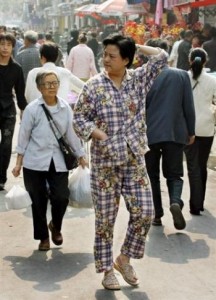However, the Chinese netters have been circulating a different story that appeared February this year (UPDATE: also covered by China Music Update in March). According to a music industry insider, Sun Mengjin, cancelation of Dylan’s China concerts had to do with the steep mark up by original concert rights holder (Brokers Brothers) rendering the concert not financially viable for local promoters, and out-of-control greediness in Chinese concert promotion industry:
Continue reading »
minipost-[Translation] Greed Destroyed Bob Dylan’s Concert
24 Comments » newest
Political Prisoner?
196 Comments » newest
This is a follow-up to a post earlier this month, “A political prisoner in Sweden.” I promised to translate the text of the sentence from the original, and have finally finished proofreading and putting in comments.
A Brief History of the Sino-Indian Border Dispute and the role of Tibet
172 Comments » newest
After refusing to sign the agreement himself, he was made to sit in a separate room, and behind his back, was signed one of the most controversial and bizarre treaties in human history – The Simla accord.
For over a century, the intricacies of the border between India and China/Tibet have baffled scholars. In fact, the plot leading to the Simla conference and beyond actually plays just like a thriller movie or book. The sheer complexity of this problem can be judged by the fact that 36 rounds of negotiations have taken place between India and China at different levels since 1981; but they have yet to reach a settlement.
Is the Politiburo smoking weed?
24 Comments » newest
Now, we are all aware of the severe Cold-Waresque bias against China in large parts of the Western media, amounting to literally a childlike obsession, but this article really takes the cake. The author, Ambrose Evans-Pritchard, is in fact the international business editor of the newspaper!
But coming to think of it, in a way it also serves to be a bit of a laugh actually. Nothing beats a taste of good old British comedy. Who knows, we might be witnessing another Mr. Bean or David Brent in the making!
You Scratch My Back, but I Won’t Scratch Yours
45 Comments » newest
The two Asian Giants are still not able to figure out the line which divides them – in the longest running border dispute in modern history. This dispute offers interesting lessons on how to, and how not to, handle boundary issues. The analysis of Chinese behavior in the negotiations is doubly important given China’s perception in the west of it ‘flexing its muscles’, and China’s theory of ‘Peaceful Rise’.
About a century ago, Sir Henry McMahon, the then British Foreign Secretary, took a think red pencil and sketched a line between India and Tibet on a map – a line which has resulted in the two most populous nations in the world going to war, costing more than 2000 lives; and which has created enormous mistrust on both sides, especially in India.
Consequently, on 3rd July 1914 was signed one of the most bizarre and controversial agreements ever known to man – The Simla accord, the complexities of which have yet to be unraveled.
Continue reading »
A political prisoner in Sweden
Poor Rebiya Kadeer, when she was convicted and sentenced in China for “leaking state secrets”, the indignant people accused China of prosecuting people for political crimes and “suppression”. Now, we learn of yet another poor old Uighur, this time a 62-year-old man named Babur Mehsut, who has been arrested and jailed for “unlawful acquisition and distribution of information relating to individuals for the benefit of a foreign power.”
In Sweden. The arrest was made by Säpo, that country’s secret service.
What was his crime? He passed some information about Uighurs abroad to some Chinese journalists. Right…
Continue reading »
minipost-Happy New Year and an Announcement
17 Comments » newest
minipost-Written Interview with Kalon Tripa Prof. S. Rinpoche
66 Comments » newest
When looking at the Tibet issue, I pay special attention to the term “Greater Tibet”. I have repeatedly read the text of your statement on ‘Greater Tibet’ (including the English version). You said, “Tibet is Tibet. There is no greater or smaller Tibet”. However, the fact of the matter is, during the dialogue process between the Envoys of His Holiness the Dalai Lama and Beijing, the issue of one autonomous administration for all the Tibetan people has been raised. Obviously, it seeks to unify Tibetan areas in Sichuan, Yunnan and Qinghai Provinces into the present day Tibet Autonomous Region (TAR). Given the size of administration, it is indeed a ‘Greater Tibet’. Therefore, on account of that, the ‘Greater Tibet’ which Beijing asserts is not wrong because the reference was made from the present status of Tibet. You have, on one hand opposed the usage of word ‘Greater’ as in ‘Greater Tibet’, while on the other hand, maintained that ‘size should not matter whether big or small’. Are not these two statements contradictory?
Continue reading »
Chinese Bloggers React to New York Times’ Vocational School Cyber War Story
2 Comments » newest
– 一个培养厨子的地方居然有这么大的秘密
(A place known for its culinary program have such a huge secret)
– 学计算机不要上清华了,还是蓝翔牛啊。
(Forget learning computers at Tsinghua, Lanxiang is awesome.)
– 这个学校这下是中了6合彩了
(This school has won the lottery)
– 蓝翔技工学校的学生有能力攻击google?
(Lanxiang Technical School students have the ability to attack google?)
– 为什么山东蓝翔高级技工学校强于哈佛大学?
(an essay titled “Why Lanxiang Vocational Is Better Than Harvard”, satirizing the “X University is better than Harvard” Chinese internet meme)
minipost-Universal Rights as National Identity?
25 Comments » newest
minipost-Happy New Year, Chen Shui-Bian?
99 Comments » newest
Google vs. China – Good vs. Evil?
94 Comments » newest
What do you do if it says “No photographs and video taping” ?
The ongoing talks about Mainland Chinese’s civic conscience and daily public behavior are mostly negative. But it is not always racially prejudicial nor finger pointing. All we have to do is to look at this guy Haison Jiang and listen to his friends. He defiantly sneaked through Newark’s Liberty Airport and caused a 6 hour delay and pain for several thousand people. Forget about what the US should do or do to that TSA guard who stepped away. They should improve, make changes and the guard should be reprimanded, etc, etc.. But the fingers should all point at Jiang. With people like this, what can we really do? Why he did it? Here is the interesting part:
Jiang’s friend said, “He didn’t mean anything malicious!”. That’s it! These are well educated graduate students. Not poor peasants from some rural villages. That showed how low and distorted their sense of right or wrong has become. As long as Jiang did not carry a bomb, what’s the big deal if he ignored the signs and rules? How clumsy and inefficient the Americans are.
Who said Jiang was malicious and did it have to be malicious? It all comes down to “pay no attention to the rules”, “pay no mind to other people” and “pay no mind to the signs”. I don’t think Jiang meant anything malicious. So are those who spit in front of you, talk loudly on subway trains, cutting in front of people who are waiting in line, taking pictures and videos where it is clearly prohibited, smoking where they shouldn’t ……. No wonder they said China has more freedom than the US.
My uncle spat on the rug in a restaurant in Guangzhou and said it was okay because the workers would clean the floor every night anyway. He didn’t mean to be malicious. I don’t even think that those who sold tainted baby milk meant to be malicious. They just wanted to make more money and couldn’t care less about anyone else. These are just characteristics of a people whose values had been distorted first by a brutal and destructive period of time and then by a materially rich but morally poor and intellectually stifling system. A political system that believes that by having control, censorship, a single voice, a single national ideology and a single life’s aspiration will lead to a safe and harmonious society.
At my age, I am not sad any more. China is still not free. It is a authoritative state. The crime is: it sweetens the bitterness by corrupting the mind of its people. Everyone becomes materialistic. The most rewarding and safest way to live in China is being materialistic. I don’t give a damn for the people who choose to ignore this part of China and just go for its wealth and opportunities. I don’t feel any part of this “rising great nation”. But the West is going to learn. It may not be China’s toys, drywall, tires, bogus CDs, or its money and military might that will bother and scare the West. It may well come down to someone who urinate in their streets. The latter is more realistic.
minipost-Public Opinion in Taiwan
46 Comments » newest
minipost-Copenhagen Agreement
175 Comments » newest
minipost-An 1833km pipeline for regional peace
Continue reading »
李白 (Li Bai, 701-762AD): 静夜思 (Thoughts on a Still Night)
23 Comments » newest
Continue reading »
Continue reading »
Shanghai Style: Pajamas in the Great Outdoors
23 Comments » newest
 It seems the long held social custom of Shanghainese to walk down the street in their pajamas is causing some discomfort to the organizers of the Shanghai World Expo scheduled for next year and a campaign has been started by the municipal government to end the practice.
It seems the long held social custom of Shanghainese to walk down the street in their pajamas is causing some discomfort to the organizers of the Shanghai World Expo scheduled for next year and a campaign has been started by the municipal government to end the practice.
It’s not that unusual to see middle aged women milling around on the street in their pajamas, or even walking to the subway or local shopping mall. So the slogan “No Pajamas in Public – be Civilized for the Expo” has been coined to end what the government feels is uncivilized behavior in a modern, world class city. As China Daily columnist Raymond Zhou said recently in “In Defense of Pajamas”:
“So, it’s not really about whether we like it, but rather about whether we are liked. Again, it’s the quintessential concept of “face” and “saving face”.
Not many Chinese are shocked to see a street full of pajama-wearing pedestrians, but if international visitors feel squeamish about it we should stop doing it. Or so the implied rationale for the crackdown goes.”
The city’s tactic to stamp out street pajama wearers was to create a team of 500 volunteers to use persuasion at bus stops and other venues to convince pajama wearing Shanghainese residents to change their clothes.
Opinion:Making Sense of the Dollar and Yuan
36 Comments » newest
Yet despite the goodwill generated by the trip, there is one sharp difference that festers between the two – and that is the value of the Yuan. Many in America feel that the Yuan is not only undervalued, but has created a huge trade deficit, setting in motion the current global financial crisis and threatening to prolong the current U.S. recession. Continue reading »


Recent Comments